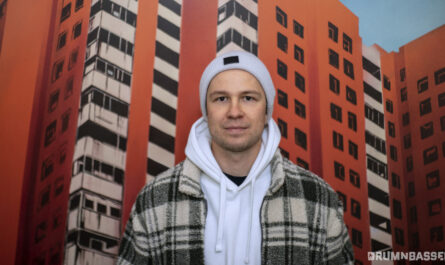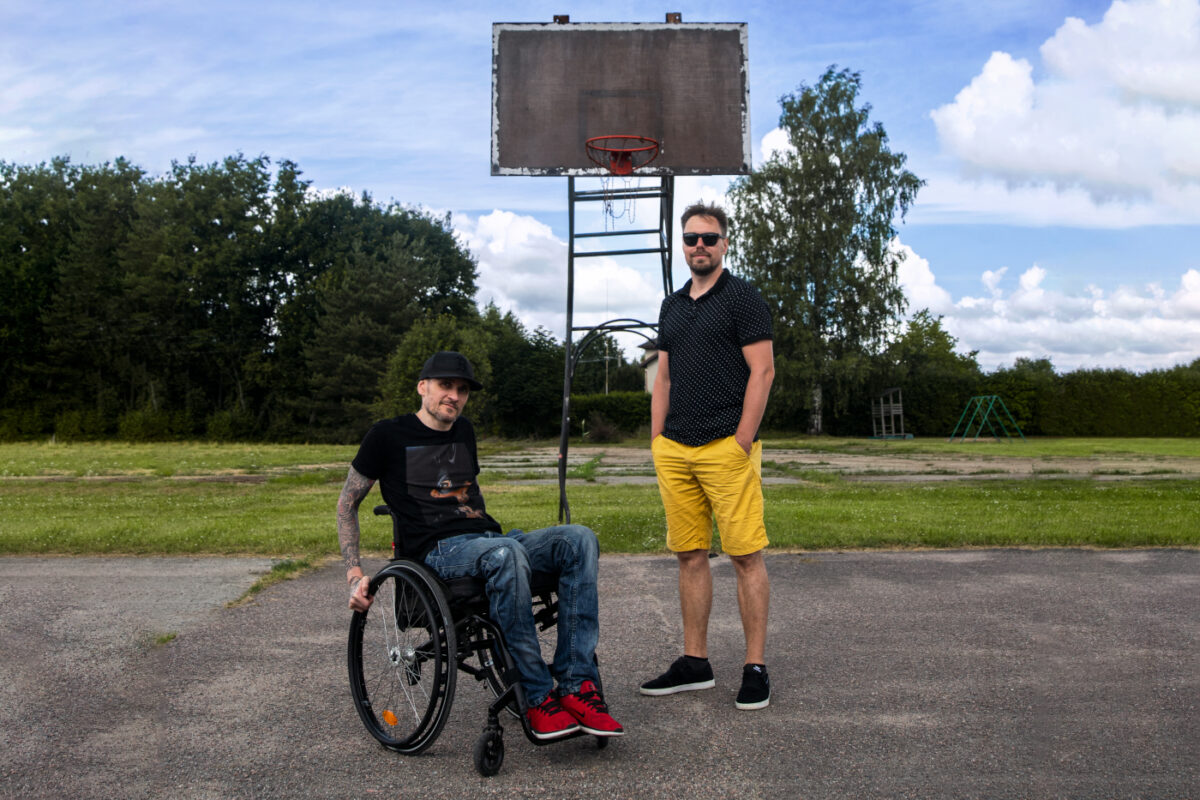We sat down with one of the Estonian electronic music pioneers Lu:k to travel back to the 90s and also to peek into the future.
How and when did you discover electronic music?
It goes back to the 80's when I discovered that Finland has a thing like Radio Mafia. And at that time my parents had just bought me a double deck cassette player, which I used to record the radio shows. The hunger for music was so strong that I recorded all the shows they played there. I’ve kept all the recordings. So anyway, they played electronic music and also hip hop. And from time to time they played little bits of breakbeat’i. Of course things were totally different back then and it was a case of luck when you managed to record some snippets. But breakbeat was the thing for me- when I first heard it, I just knew - that's it, that's the music I want to listen to. I fell in love with the music and from there on I started looking for it as much as possible.
How and when was the group Lu:k formed?
That’s a long story but it was already in high school when Indrek, Tõnis and I formed an instrumental hip hop band. It just transformed into electronic music. By that time we were all listening to so much electronic music that we felt we wanted to start creating it as well. So first we bought some Soviet-era drum machine that we did our first stuff on. I can’t remember what exactly happened to it, but anyway then Indrek built a computer 265 with a sound card and a sampling machine. He soldered all the wires and stuff together by himself, but we didn't have the money to buy a case for the computer so everything was just piled up on the table. So that’s how we started producing music in such a primitive way.
The precise or actual beginning of Lu: k was in July 1994 after we graduated high school. The very first time we started we were at my place and I even have a video of it because I filmed the whole thing. I remember producing music the whole night and then the next morning we came up with the name Lu:k. We wanted it not to mean anything but by all means, it was after an all nighter so we were quite in a zombie-like state already. We didn’t think that the name would mean anything in Estonian, but it does - like a hatch or a trap door. We thought it was something completely meaningless.
At the beginning there were three of you (Tõnis Valk, Virko Veskoja and Tõnis Tamm), but now there’s only you behind the original group you named Lu:k. What happened?
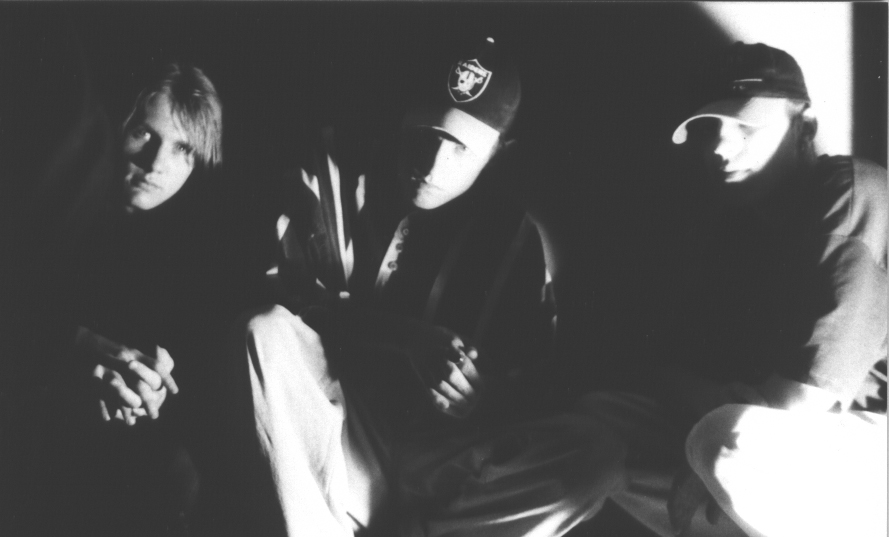
Tõnis left the world early. He was a genius, a super talented guy, who lived rather inside himself and I didn't exactly know what he really felt or what his thoughts were. At first we were all together in that Lu: k thing, but after a while it seemed that he didn't want to carry on. So we went on making music together just the two of us - Indrek and I. But very soon we discovered that we had different views on things, so he started with his own projects and my focus had already shifted onto my university studies. I did carry on with Lu:k to some extent though.
“Tõnist näen ma tihti unes ja suhtlen temaga huvitavatel teemadel, näiteks kus asub ikkagi inimese teadvus. Indrekuga ei suhtle enam ammu, kuna mõlematel oma pere ja omad tegemised.”
It’s important to mention that on my own I couldn't have made it happen, nor would have the others. Back then the vital components were our friendship, the team spirit, position of the stars, the time and also where we were. We all complemented each other, at least at the beginning. Looking back now it wasn’t such a long time period at all but back then it felt like ages and that’s because we were so busy and everything moved at a really fast pace. Right now I can’t say I have abandoned Lu:k but I will have to wait and see how to move forward. Music is my circulatory system after all, for me it’s like a way to exist.
When was your first release and on which record label?
It was released on the record label Kings of Shortways and if I recall, it was in the winter of 95. It was owned by Vadim Druzhkov.
We recorded our cassette in the Helikassettitehas, which was located in Mustamäe (Tallinn ed.). They had a studio there where we did our master of recording. And I remember it so well, that there were some ‘old guys’ with moustaches, old in our terms then, and who just couldn’t understand the whole thing.. "Stop it - you can’t turn the bass up that much!" We had the bass turned up alright, but they had a whole different world and that’s how Vadim ended up arguing with them about it.
How did you sign the record deal with Kings Of Shortwaving?
Vadim found us. At that time Vadim Druzkhov was a successful DJ. We met him at our first gig in the foyer of EKA (Estonian Art Academy). Back then it was called "pe*sekellad" (Ar*se-bells- translation, ed.), because there was always something that failed, either the speakers didn’t work, a power cut happened etc. So that’s where all kinds of people started to come to us and tell us all sorts of stories..
But Vadim meant business and as far as I know, he was in touch with this Aphex Twin guy - Richard D. James. He was a guy who knew what was going on and where and he organised the whole thing. He used to be a drummer for Dallas by the way. He has now completely withdrawn from that world and is working in a record store in the old town in Tallinn.
How would you describe your creative process?
Well, we could say that if you put together three big personalities, you can’t expect big results. We decided that whether we produce together or not, we're always going to use the same name - Lu:k for all of it. Most of the time we produced all separately but sometimes also together. I think the best and the coolest track we all did together is Sle:p-De:p.
You’ve used the semicolon a lot in the track names - the same way it’s present in the name Lu:k - is there a particular reason behind it?
I think Indrek, who was a huge fan of English language, was behind it, or maybe even Tõnis’ brother, who’s now a famous poet, Kalju Kruusa. A really interesting guy, who was also one of us back then. He was older than us, and really intelligent.
‘La: v’ and ‘Lovin U’ are cult classics for all the drum and bass/jungle fans. Which of your own tracks would you consider as the best? Could they be the same two?
Yes, I produced those tracks. Back in the day we had a deal that we won’t reveal who did what and which track. Which ones would I consider as the best? I’ve never thought about it before. I suppose the same tracks - ‘La:v’ and ‘Lovin U’. I think these two were the very reason we became successful in the first place.
I produced ‘Lovin U’ purposely to sound like a hit. Although back then I had no idea how to produce hits, it’s built on an idea or a concept that I had in my head and I didn’t follow any rules.
‘La:v’ came spontaneously. I did something and it worked. That song has some indescribable magic in it which I wasn't aware of at the moment that I was doing it, it came from a higher place. That’s the way it is with music- if the right thing comes, it’s not coming from inside you, it comes from somewhere higher.
When did you realise that you’ve created something really BIG?
To be fair, I didn’t have this ‘WOW’ moment. I was quite insecure in the beginning and I didn't think that it was something at all. That’s because at the time when I created the tracks, the overall mentality in society was that electronic music is something that boys can do, it wasn’t even considered as music. But also because I can’t read music sheets and I know nothing of academic music, it made me feel like - who am I? The way I took the whole production process was that it came from somewhere, I needed to do it, it had to be done, I absolutely loved it and that’s it - that’s how it happened. And thank god, it happened that way otherwise it wouldn’t have happened at all. If I had started thinking of it in an academic way, then I suppose there would have been one mistake after another and that’s it, then becomes full of them, even when thinking about the quality of the track.
It has actually hit me in the past five years, that I’ve done something great. I’ve begun to value the stuff I did back then. Of course now the distance in time is different as well.
Are there any tracks you feel could have gained more attention? Tracks that were perhaps important to you?
Maybe something that hasn’t been released. Just recently I discovered a track that I remember was made a long time ago but has an insane power in it. It’s as powerful as La: v and Lovin U. It’s not only the song itself but it has that mystical magic in it. Unfortunately, it’s unfinished and I don't have it in digital form, it’s on a demo cassette. I think it should be released - one way or another, perhaps even on a vinyl.
How did you manage to get your tracks played on radio stations outside Estonia? For example in the Gilles Peterson show ‘A Thing called Jazz’ on Radio Maffia in Finland?
Oh that’s a good story. I happened to be in Finland by chance and once again recording this Gilles Peterson show on Radio Mafia. Had my headphones on and then suddenly I heard: ‘Surprise from Estonia - Lu: k". That kept me ecstatic for weeks. I reckoned Koit (Raudsepp) or Saaremets had sent him the tape, but as it came out, Peterson himself had found the green vinyl (‘Cut The Cop' edit) we released.
What were your means to reach the audience back then?
To be honest, we didn’t do anything. We didn't have management as such. We basically just dropped our demos to various radio shows and that was it. But we did it frequently and every week we took them to different shows. Mainly to Saaremets of course, but also to Meelis Meri (who worked in Top Radio back then), Koit Raudsepp and also to Mihkel Roosberg. We sent them even to Tõnis Leemets, who had a jazz themed broadcast.
Raul Saaremets has mentioned that the packaging of your demos used to be somewhat unique. So you did some promotion?
Yeah, we did all sorts of tricks - it was quite interesting. I had professional photos taken of those demos and I still have them.
But for demos, we used to cut the cassette tape in an exact length of the track. So there were only small rolls of the tape on them. And the design had a different concept each time as well. And we had some kind of drawings in those envelopes or something as well. I haven't really thought about it before, but actually it’s very interesting and like a completely separate genre.
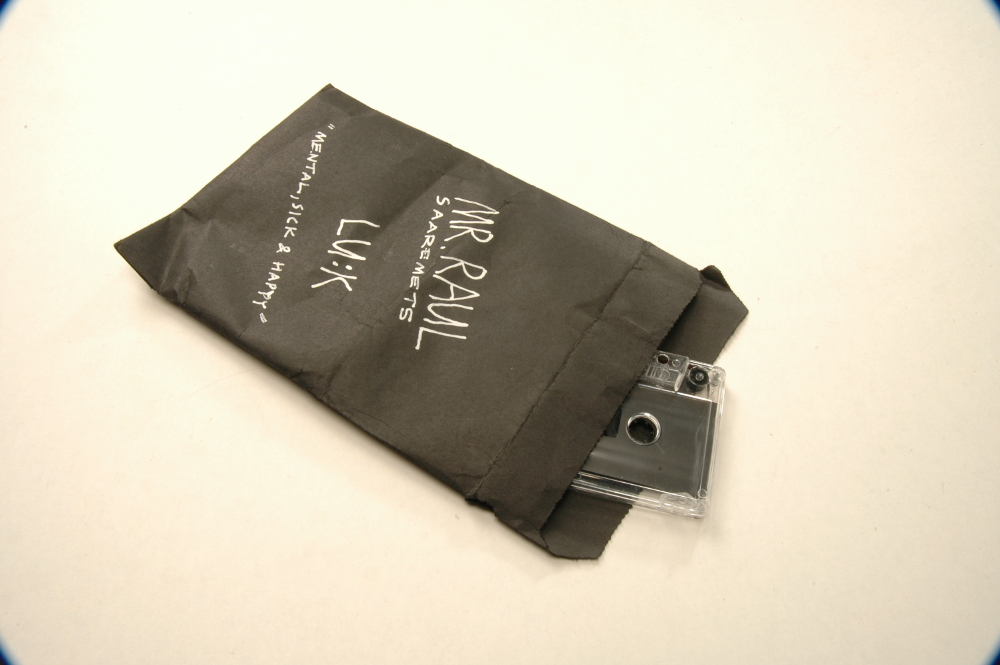
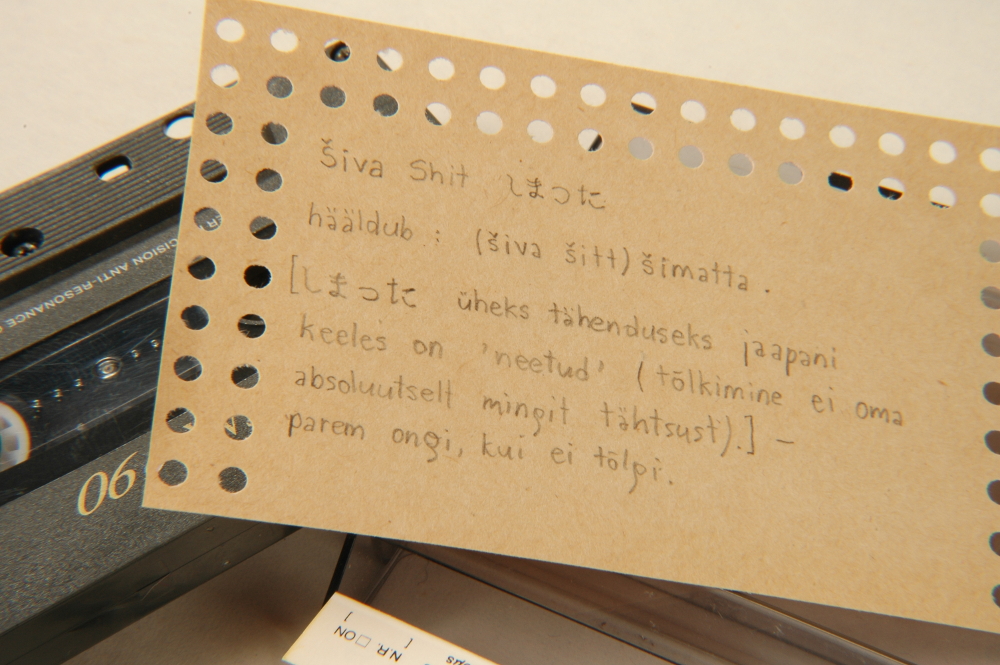
How would you describe the general vibe of the scene in the early years? What were the events like and where were the main venues?
The scene wasn't as specialised or focused as it's now, there were just cool events where they played pretty much everything. They played breakbeat, house, hip hop- everything went. Not as much trance though, it was more a Russian thing, actually the whole thing seemed to be like some parallel universe. General idea, even nowadays, is that you’re going out for a hookup with girls or to drink alcohol or to abuse drugs. But for us the main reason was to listen to good music and to dance.
The main event centres were Tallinn, Tartu and Pärnu. A great example and the main place where everyone went to was club Bel Air in Tallinn. As far as I know then Rhythm Doctor had his first gig there as well. It was a legendary place where we both performed and just went to listen to some great music. There was club Illusion in Tartu, Roheline salong (Green salon transl.) and club Mai in Pärnu, and some venue in a school basement in Viljandi as well.
Who would say played the biggest part in the growth of the scene in Estonia?
An important person was definitely Aivar Tõnso, who really enlightened me about music. At the beginning of the 90´s, before Lu:k, I got some breakbeat stuff from him. Later came Saaremets and Mihkel Roosberg, who used to be a great broadcaster. In the very beginning there were also Drone- two guys I think.
There were guys all over who did their thing here and there, but Lu:k kind of went high up to the top and then there was a long period of nothing and then Flexus came.
Would you consider yourself to belong to some specific genre or would you prefer to avoid putting labels?
I don't want to label myself, because I´m not actually a musician. I am who I am. At the time I had the opportunity to express myself in that way. But if we had to label, I’d classify myself as a breakbeat follower, especifically the breakbeat we had at the beginning of the 90s..
Your live performances with Lu:k are well known for your DJing with cassette tapes. Is there any hope seeing you perform in the near future?
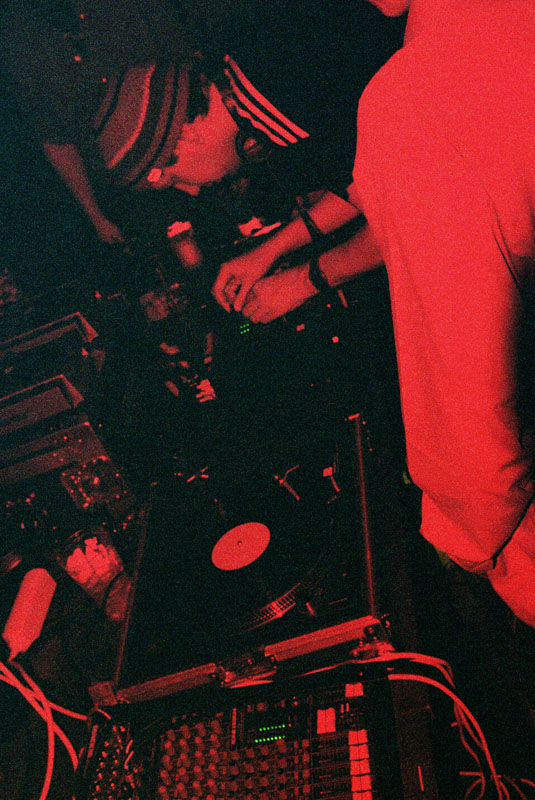
I’ve tried, of course, but it’s quite annoying to play with cassettes. The way it usually goes: suddenly one of the players doesn't work and then there are numerous problems with the cassettes themselves. Usually I play regular audio CDs that I have with me for a backup and they’ve truly saved me on such occasions. Of course people think that I play with cassettes, because I have a pile of them in front of me, but that’s a half-truth.
Another myth that has circled is that ‘what are these Lu:k guys doing at their live performances at all, just eating cake’. First of all, we didn’t eat cake and secondly - we just drank beer. Of course, when I was younger, I felt pressured to perform live. I have a finished track, I put it on - all good. I don't have to mix my tracks, I play them. The same tracks that were made back then and weren’t made for mixing to begin with.
Do you play only your own tracks during your lives?
One hundred percent! Of course, when it’s advertised that I'd be playing my favourites or they‘ve asked me to play my DJ set, then I play totally different stuff. Some music from Brazil or that easy listening music, for example 60´s -70´s.
What kind of music do you prefer nowadays and do you go to any gigs to listen to some new music?
Ei käi pidudel. See muusika nälg on täpselt samasugune, kui siis, kui oma esimese loo tegin (17-aastaselt). Vahe on selles, et siis ei olnud nagu üldse midagi saada, kilde said. Aga mis puudutab kaasaegset muusikat, siis hästi palju on müra, jõhkrat müra. Ma ka kuulan drum and bass’i saite, mida on nii palju, ja ikka metsikult tuleb seda jama sealt. Ja aeg-ajalt tuleb siis mingisugune pärl. Muidugi noorena on neid “ohhoo” elamusi rohkem, inimene on vastuvõtlikum. Nüüd on mingisugune kultuurikiht nagu peale kasvanud ja ma olen nõudlikum, aga samas see nälg on täpselt samasugune. Ja siis, kui leian midagi “ohhoo”-d, siis on jube hea olla.
What’s kind of important and what has stayed with me, is that Aphex Twin guy - Richard D. James. I also like that there’s not much known about him, he doesn't give any interviews. His music is really interesting. It would be awesome to meet him and get to know him, but it seems like he’s unapproachable. Another super producer is Photek, not the current stuff but back when he first started. It was absolutely insane what he did. I still listen to Photek as though it was all fresh and new stuff, the very first albums in particular.
Where do you find new music?
The main sourcers are Mixcloud, Soundcloud and YouTube. You’ll discover loads of them through Soundcloud. And there’s all sorts of boiler-rooms and stuff on YouTube. Whenever I hear a DJ playing something good, I have to look it up right away.
Do you have any unfulfilled dreams or collaborations which you’d like to do in the future?
Yes, I do - music. At some point I almost pushed it all aside, kind of gave up on all of it. But this summer my eyes opened for a different view on things and it just kind of confirmed to me that I should be creating music again.
What would be your advice for the younger generation of producers?
The only advice I have - do your own thing! I can see how much everyone is copying each other and there’s this competition. You can't really create or be creative when you have competition.
It’s important to find yourself and do exactly what you want to do. I have noticed that when you're doing your thing, people start coming to you instead of you going to them and you don’t have to force it, because if you force it, it won’t happen. But about my words of advice - everyone has to find their own meaning in them, see behind the words and then find the way.



